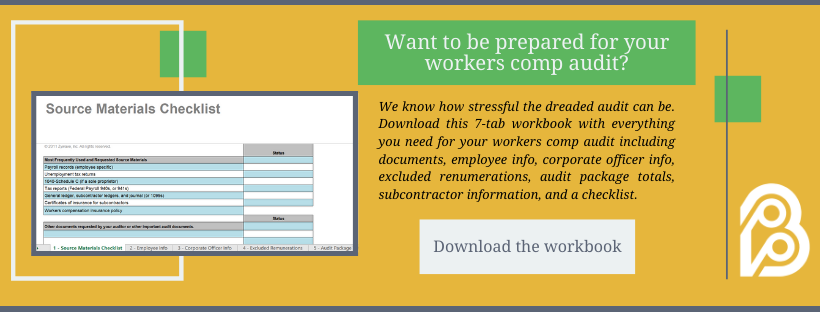How (and When) to Switch Workers’ Comp Carriers
Your workers’ compensation insurance agent and carrier can make your life much easier, much harder, or anywhere in the middle.
So if you’re not completely satisfied with your current workers’ compensation situation, you may be going back and forth on whether you should move on and switch to a new carrier.
Maybe you’re wondering if working with another carrier will actually be any better than working with the one you’re with now. Maybe you’re concerned you’ll be penalized for canceling your policy mid-term. Maybe you're wondering if switching will be complicated or stressful. Maybe you don’t want the pressure of cutting things off with your current carrier.
These are all valid concerns. But not to worry – at Berry Insurance we’ve remedied these concerns before and we can do it again. And while your concerns are valid, you’d be surprised to learn the repercussions of switching your carrier are much less severe than you fear.
In this article, we’ll help you decide when it’s the right choice to switch carriers, lay out exactly how the process works, and explain potential issues you might have when switching.
Table of contents:
- When you may want to consider switching workers’ comp carriers
- How to switch workers’ comp carriers
- Potential problems with switching workers’ comp carriers
When you may want to consider switching workers’ comp carriers
Whether your agent is getting on your last nerve, or you just think there may be a better fit out there for you, there are several reasons why it may make sense to switch workers’ compensation carriers. Here are some instances when it may be the right move to switch.
There is a carrier/agent specializing in your industry
With so many different industries out there, not every insurance carrier is an expert in every industry. They may be able to write your coverage, but it doesn’t necessarily mean they have the best expertise for your situation.
Some carriers specialize in specific industries and can offer more insight and resources than other carriers. So if you find a carrier who specializes in your industry, it may make perfect sense to make the switch.
You’re interested in a payroll deduct plan
Some insurance carriers offer “payroll deduct” payment plans if they use a payroll vendor that works with the carrier.
Essentially, you can run your payroll through their payroll vendor to be reported to the insurance carrier so you only pay workers’ compensation for your actual payroll each period. This helps control costs since you only pay for what you actually have in payroll, and eliminates the need for an audit, since the payroll is already being reported to the carrier.
If the client uses a payroll vendor that works with a carrier that offers payroll deduct, it's an incentive to switch.
A carrier has filed for a special rate deviation
Even though workers’ compensation rates are set by the state, carriers can file for approval to offer a discounted rate. Not many are approved, but there are some carriers that for certain industries/class codes are able to offer slightly reduced rates, which may make sense for you to work with.
Another carrier/agent is offering risk management
Some insurance carriers just offer services that others don’t.
And when it comes to workers’ comp, some carriers offer the minimum while others prioritize extra services such as risk management.
This could include claims management, return-to-work programs, medical clinic relationships, safety programs and more.
If you want help with risk management in your company and you identify a carrier who has a particularly great risk management program, it’s probably worth it to work with them.
You’ve experienced poor customer service
This one should be a no-brainer. Your insurance company is there to serve and protect you -- simple as that.
Maybe they’re rude to you, don’t return your calls, or have mishandled your policy details or claims. Maybe they treat you like every other customer, not customizing your policy to your individual needs at all.
No matter the situation, if you feel like you aren’t being properly supported or treated by your insurance company or agent, it might make sense to start shopping for a new one.
You’re moving out of state
If you’re moving out of state, you may be able to stick with your current company, but often, carriers are only licensed to provide insurance in the state they are located in, or limited states.
If you’re moving to a state your agent or carrier isn’t licensed in, you’ll need to find a new one.
How to switch workers’ comp carriers
Any of the reasons we outlined above are valid reasons to switch workers’ comp carriers. So if you’re in that position, you probably want to know what to expect from the process.
Fortunately, it only takes a few steps on your part.
1. Decide on a new agent
Believe it or not, deciding on your agent is the first step in getting a new workers’ comp policy. You may think the best option is to shop around and get quotes from multiple agents but actually, when it comes to business insurance, that strategy can get you into some trouble.
When you request business insurance quotes with an agency, you “block the market” from other agencies. This essentially means more than one agency cannot quote with the same carrier.
For example, if you request a quote with an agency and they request a quote with X-Company, then you go to another agency and they also request a quote with X-Company, the second agency (and any others after) will not be able to get a quote from X-Company.
This block can only be undone if you sign a BOR, which can also be a pain and slow down your insurance process.
Since many insurance agencies work with the same carriers, if you’re quoting with multiple agencies, none of them will have a full range of quotes to look at and compare, so they won’t be able to do their job well and you will have less options for insurance carriers.
That’s why it is really important to decide on a business insurance agency before getting quotes.
But how do you know what to look for in an agency? To help you find the right agency for you, read this article: What to Look For when Selecting an Insurance Agency or Company.
2. Get a quote
Once you have an agent, it’s time to get a quote.
To do this, you will have to answer several questions and provide information and documentation. Some of these factors may include:
- Business operations information
- Ownership and experience information
- Financial data
- Contracts
- Claims history
- Copies of current policies
- Applications
For more information, check out this article: What Information do I Need for a Business Insurance Quote? And if you want to organize this information for a smooth quoting process, download the worksheet below.
3. Sign a cancellation request
Your agent will then prepare a cancel request form for your previous policy and ask you to sign it, which can usually be done electronically. Your new agent will then send the signed cancel request over to your previous agent, who will cancel your prior policy.
And that’s it on your end! Your agent will formalize your policy, and send you a copy.
Potential problems with switching workers’ comp carriers
If you have a good reason to switch your workers’ comp, then it is probably the right thing to do, but that doesn’t mean it won’t cause any inconveniences.
But fortunately for you, these inconveniences are usually only minor. Switching carriers won’t cause any huge problems and you won’t be penalized for canceling your old policy.
But if you switch your workers’ comp policy mid-term, you might experience a couple hiccups.
You could have more than one audit:
If you switch your workers’ comp policy in the middle of your current policy’s policy period, you will be dealing with two audits. You might even be dealing with two audits at the same time!
For instance, if your current policy runs from January to January and you decide to switch your policy in February, you will likely be finishing up your audit from the prior year while also having to take on an audit for the January-February portion of the policy you are canceling.
Another thing to note about audits when switching: Most carriers ask if you have any owed premium to a previous carrier. and if so, you have to pay it before you can put in force the new policy. So you may not want to make a switch around when your audit is, otherwise you could have to pay a lot all at once to switch.
Navigating audits can be stressful, so having to handle two in a year is doubly inconvenient.
Your anniversary rating date won’t match your policy date:
If you operate a business that has locations in both MA and another state, you may be familiar with the “anniversary rating date” endorsement.
The anniversary rating date is the date you first got a workers’ comp policy. This date is used for any application of industry or policy changes that occur and it doesn’t change even if you get a new policy on a different date.
So if your anniversary date is January 1 and you canceled and rewrote your policy on June 1, your anniversary date is still January 1 even though your policy renews in June.
This means if the workers compensation state board files a rate change in August for example normally that rate change wouldn’t happen until your policy is renewed, but because you changed their policy dates, now when January comes, the new rates will apply.
It’s not really a huge problem, but it can be inconvenient or confusing for some people.
Settle on the right workers’ comp carrier and never switch again
See? Not as stressful as you thought, right?
While being in the position of needing to switch carriers isn’t ideal, sometimes it’s just the right move to minimize your workers’ compensation frustrations.
So if you’re ready to switch carriers, remember: deciding on an agent is the first step. So it’s time to begin your research!
We recommend working with an agent who can place you with the right carrier and help you effectively manage your policy, claims, audits, and renewals.
To learn more about what you should look for in a workers’ compensation agent, check out this article: 7 Things your Workers’ Compensation Insurance Agent Should be Doing for You.


.jpg)

